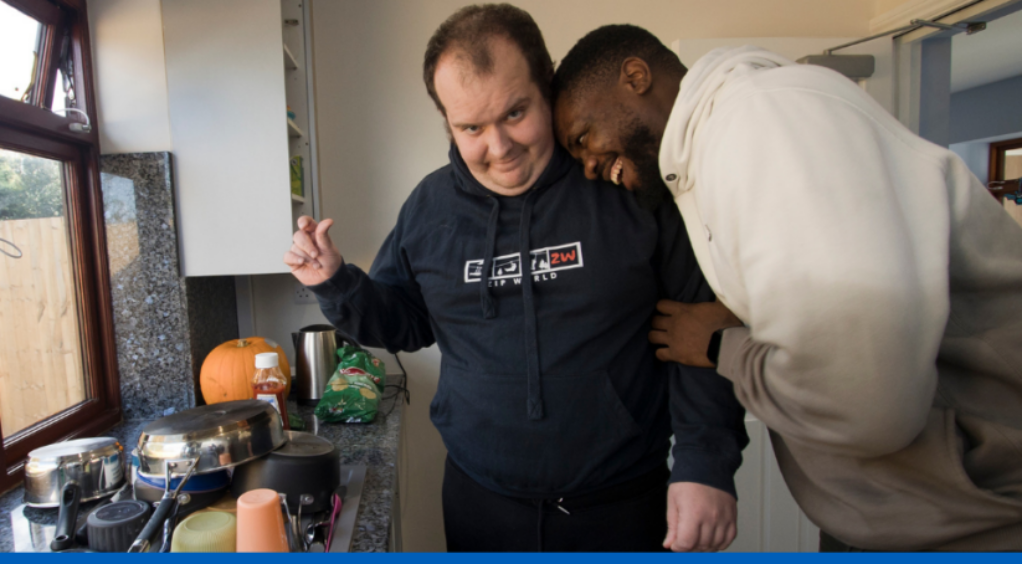“Our story shows how NHS teams should provide personalised care”
A young man who had spent much of his life in residential care has seen his health and happiness dramatically improve, thanks to a move into his own home.
The story of Olly Gray, who has severe learning disabilities and autism, has been hailed as an example of how the NHS in Derbyshire should work better with patients by providing a service that is personalised to their needs.
Olly, who is aged 29, had lived in NHS-funded accommodation from the age of 14, where he was provided with 24 hours a day support by carers.
His parents Sue and Owen were shocked when they were told he would have to leave this residential unit because the provider no longer met required standards.
They initially rejected suggested alternatives as being inadequate for Olly’s needs.
However, a team from the NHS then worked together with Olly and his parents over nearly two years to help him to move into his own bungalow, where he is supported by his own team of carers.
The change means Olly is a tenant of his care provider, not an NHS patient in residential care, so he can claim housing benefit and other support that he previously could not. His care remains NHS funded.
Olly’s mother Sue said: “Olly is severely autistic and has complex needs and challenging behaviour. He can’t speak. He can understand quite a lot. He is somebody who needs quite a lot of very specific care and understanding.
“He moved into a residential school aged 14 and when he became an adult he moved into a flat complex with other people who have autism, but that was in Barnsley.
“As we prepared for the move we were very concerned that that things would go badly and he would have a lot of behaviours and he’d be very unhappy.
“But the opposite happened. He seemed to settle very quickly. He was calmer. He was smiling a lot. The staff that he’s got very quickly seemed to pick up what Olly needed, got to know Oliver very well and formed this relationship with him really quickly.
“Olly’s got a replica of residential care in his own home and that’s what he needed.”
Sue and Owen Gray were so grateful for the support they were given and are so pleased with the improvement in Olly’s health that they asked to share his story with NHS managers.
A film in which they explain their experiences was recently shared with a group of the most senior nurses and doctors from every NHS organisation and council adult social care team in Derby and Derbyshire.
Jo Hunter, NHS Derby and Derbyshire deputy chief nurse, said: “We are so pleased that Olly is now able to live a life that is much better than it was previously, thanks to the care and accommodation solution we were able to agree with his family, with him and with his carers.
“It was very difficult but by really listening to the family’s wishes and thoroughly understanding Olly’s needs and his wishes we have been able to provide care that is much better for him.”
Jo worked personally together with Sue, Owen and Olly, alongside other NHS colleagues and care provider IBC Healthcare. It specialises in providing care for highly complex patients.
Jenny Payne, Chief Operating Officer iBC Healthcare, said: “We are thrilled to have been part of Olly’s journey to finding his forever home, where he now receives the specialist support he deserves.
“This milestone reflects the incredible collaboration between iBC Healthcare, Derbyshire NHS teams, and Olly’s family.
“From purchasing his house and undertaking bespoke adaptations to delivering tailored in-house training and ensuring Olly’s smooth transition, every detail was centred around Olly’s unique needs and preferences.
“Seeing Olly settled and thriving, with such positive feedback from those who know him best, has been wonderful to see.
“At iBC Healthcare, we are dedicated to supporting individuals with complex needs to live fulfilling lives in their communities, and we can’t wait to see all that Olly achieves in the future.”
The approach used has been hailed as being an example of how “quality conversations” between NHS professionals and patients lead to better health and wellbeing as well as less reliance on medication and reduced cost.
“Quality Conversations” is the name of a training programme run by Derbyshire Community Health Services (DCHS) Foundation Trust which all local NHS staff are encouraged to join, regardless of which organisation they work for.

